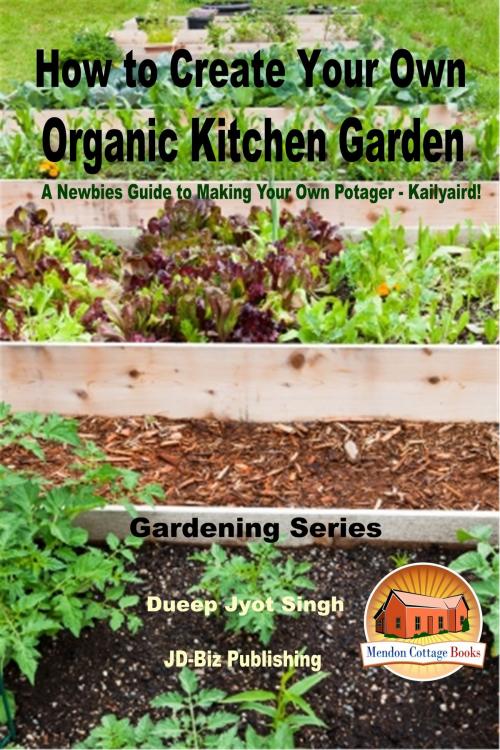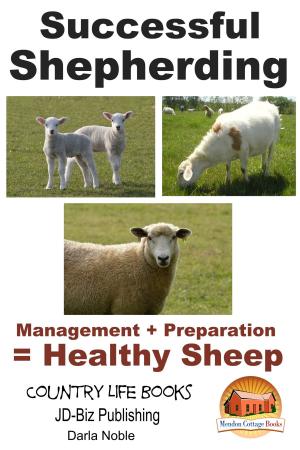How to Create Your Own Organic Kitchen Garden: A Newbie’s Guide to Making Your Own Potager - Kailyaird!
Nonfiction, Home & Garden, Gardening, Techniques| Author: | Dueep Jyot Singh | ISBN: | 9781370902019 |
| Publisher: | Mendon Cottage Books | Publication: | February 12, 2017 |
| Imprint: | Smashwords Edition | Language: | English |
| Author: | Dueep Jyot Singh |
| ISBN: | 9781370902019 |
| Publisher: | Mendon Cottage Books |
| Publication: | February 12, 2017 |
| Imprint: | Smashwords Edition |
| Language: | English |
Table of Contents
Introduction
Benefits of Your Own Kitchen Garden
Best Position/Placing of Your Garden
Basic Tools
Plants of choice
Potatoes
Lettuces
Radishes
Shallots and Chives
Carrots
Beans and peas
Spinach
Tomatoes
Basil and mint
Best Time for Planting
Preparing your Land
Planting Tips
Using Neem Cake
Succession and Companion Cropping
Compost and Soil
The Importance Of Mulch
Conclusion
Author Bio
Publisher
Introduction
As more and more of us are looking for healthier food alternatives, and easy food resources, which do not add to the burden of our limited budget, is it surprising that so many of us are interested in how to make a potager.
This is the French word for what is a kitchen garden. In Scotland, they call it a Kailyaird, or simply the yard where you are going to grow your family’s necessary requirements of fresh fruit and vegetables, depending on the space available. During the First World War this was called a Victory garden.
This is the place which is not going to be cluttered up with lots of sweet smelling blossoms. It is going to be reserved just for vegetables and herbs, which are ready to go right into your cooking pot. Also, the lawn area is definitely not going to be utilized in the making of a potager. Leave that particular area to the grass.
A kitchen garden – also known as a vegetable plot – has been used by mankind for centuries, in order to grow their own vegetables. That is because man would rather have easy access to his food, then go out hunting for it. And that is what made him add fruit and vegetables to his daily diet, instead of substance on just animal products like meat, fish, and game, which needed to be hunted in all weather, depending on the need and requirement of the tribe and family.
And that is why he began domesticating farm animals. But we, a large number of us who are town dwellers or city dwellers, have supposedly lost touch with our roots, no pun intended, and that is why we can not imagine ourselves grubbing in the family farms or plots, from dawn to dusk, in order to get enough of a harvest to feed our families.
Table of Contents
Introduction
Benefits of Your Own Kitchen Garden
Best Position/Placing of Your Garden
Basic Tools
Plants of choice
Potatoes
Lettuces
Radishes
Shallots and Chives
Carrots
Beans and peas
Spinach
Tomatoes
Basil and mint
Best Time for Planting
Preparing your Land
Planting Tips
Using Neem Cake
Succession and Companion Cropping
Compost and Soil
The Importance Of Mulch
Conclusion
Author Bio
Publisher
Introduction
As more and more of us are looking for healthier food alternatives, and easy food resources, which do not add to the burden of our limited budget, is it surprising that so many of us are interested in how to make a potager.
This is the French word for what is a kitchen garden. In Scotland, they call it a Kailyaird, or simply the yard where you are going to grow your family’s necessary requirements of fresh fruit and vegetables, depending on the space available. During the First World War this was called a Victory garden.
This is the place which is not going to be cluttered up with lots of sweet smelling blossoms. It is going to be reserved just for vegetables and herbs, which are ready to go right into your cooking pot. Also, the lawn area is definitely not going to be utilized in the making of a potager. Leave that particular area to the grass.
A kitchen garden – also known as a vegetable plot – has been used by mankind for centuries, in order to grow their own vegetables. That is because man would rather have easy access to his food, then go out hunting for it. And that is what made him add fruit and vegetables to his daily diet, instead of substance on just animal products like meat, fish, and game, which needed to be hunted in all weather, depending on the need and requirement of the tribe and family.
And that is why he began domesticating farm animals. But we, a large number of us who are town dwellers or city dwellers, have supposedly lost touch with our roots, no pun intended, and that is why we can not imagine ourselves grubbing in the family farms or plots, from dawn to dusk, in order to get enough of a harvest to feed our families.















